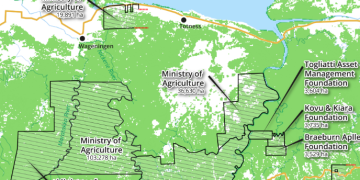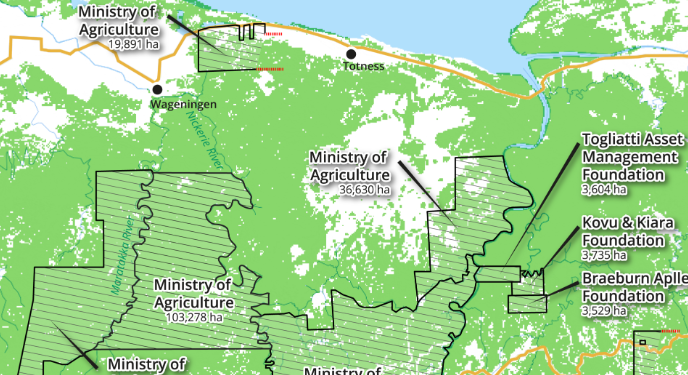#Agriculture #AmazonRainforest #Suriname #EnvironmentalConservation #IndigenousRights #EconomicDevelopment #Deforestation #SustainableAgriculture #PrivateEntities #LandDeals #Biodiversity #EnvironmentalImpact
The government of Suriname is contemplating substantial land deals that may reshape the Amazon Rainforest, allocating vast areas for agriculture, livestock, and aquaculture. The proposed deals, involving the Ministry of Agriculture and private entities, raise crucial questions about environmental conservation, deforestation, and Indigenous rights.
Land Deals Overview: Documents from September 2022 reveal that the Ministry of Agriculture is eyeing approximately 354,836 hectares of land across multiple districts. Private developers express interest in an additional estimated 10,868 hectares. This move could lead to a 2% loss of Suriname’s total forest cover if the deforestation occurs. The potential impact on forest and freshwater ecosystems, already strained by illegal gold mining, raises concerns among environmentalists.
Environmental Impact and Indigenous Concerns: Suriname, with 93% of its land covered by the Amazon Rainforest, faces a delicate balance between agricultural expansion and environmental conservation. The government’s bid to address economic challenges through agricultural growth clashes with the interests of Indigenous communities seeking rights to their ancestral territories. Experts caution that large-scale agriculture could exacerbate deforestation, affecting flora, fauna, and communities living in harmony with the forest.
Private Entities and Economic Context: Five private entities, with interests in commodities like soy and cashews, are part of the proposed deals. Covering around 10,868 hectares in the Sipaliwini district, these entities aim to contribute to Suriname’s economic development. However, the lack of transparency regarding the ultimate intentions of the Ministry of Agriculture and Ministry of Land Policy and Forest Management raises concerns among environmental groups.
Challenges Amid Economic Struggles: Suriname’s government, grappling with debt, inflation, and nationwide protests, sees agricultural expansion as a potential solution. The push to boost the agricultural sector to create jobs, increase exports, and enhance food production is met with skepticism. The Amazon Rainforest’s unique role as a carbon-negative contributor further complicates the situation, demanding a careful evaluation of the trade-offs between economic growth and environmental sustainability.
The potential appropriation of Amazon Rainforest land for agricultural purposes in Suriname demands a nuanced approach. Striking a balance between economic development and environmental conservation is imperative. Transparent planning, stakeholder consultations, and adherence to sustainable practices can guide Suriname toward a future where growth coexists with the preservation of its rich biodiversity.































